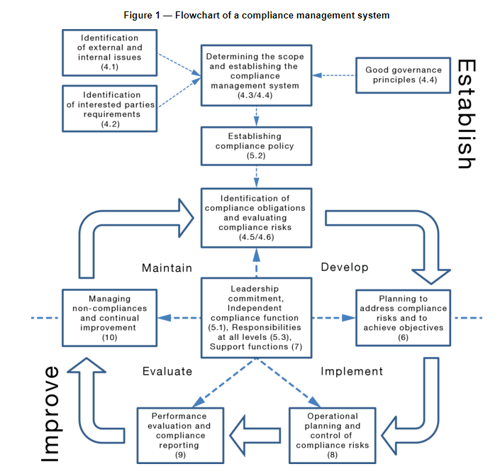
Compliance management systems guidelines — ISO 19600:2014(en)
07/04/2021
The flowchart in Figure 1 is consistent with other management systems and follows the CONTINUOUS IMPROVEMENT PRINCIPLE (https://asq.org/quality-resources/continuous-improvement)
- Plan
- Do
- Check
- Act

https://www.iso.org/obp/ui/#iso:std:iso:19600:ed-1:v1:en
Introduction
Organizations that aim to be successful in the long term need to maintain a culture of integrity and compliance, and to consider the needs and expectations of stakeholders. Integrity and compliance are therefore not only the basis, but also an opportunity, for a successful and sustainable organization.
Compliance is an outcome of an organization meeting its obligations, and is made sustainable by embedding it in the culture of the organization and in the behaviour and attitude of people working for it. While maintaining its independence, it is preferable if compliance management is integrated with the organization’s financial, risk, quality, environmental and health and safety management processes and its operational requirements and procedures.
An effective, organization-wide compliance management system enables an organization to demonstrate its commitment to compliance with relevant laws, including legislative requirements, industry codes and organizational standards, as well as standards of good corporate governance, best practices, ethics and community expectations.
An organization’s approach to compliance is ideally shaped by the leadership applying core values and generally accepted corporate governance, ethical and community standards. Embedding compliance in the behaviour of the people working for an organization depends above all on leadership at all levels and clear values of an organization, as well as an acknowledgement and implementation of measures to promote compliant behaviour. If this is not the case at all levels of an organization, there is a risk of noncompliance.
In a number of jurisdictions, the courts have considered an organization’s commitment to compliance through its compliance management system when determining the appropriate penalty to be imposed for contraventions of relevant laws. Therefore, regulatory and judicial bodies can also benefit from this International Standard as a benchmark.
Organizations are increasingly convinced that by applying binding values and appropriate compliance management, they can safeguard their integrity and avoid or minimize noncompliance with the law. Integrity and effective compliance are therefore key elements of good, diligent management. Compliance also contributes to the socially responsible behaviour of organizations.
This International Standard does not specify requirements, but provides guidance on compliance management systems and recommended practices. The guidance in this International Standard is intended to be adaptable, and the use of this guidance can differ depending on the size and level of maturity of an organization’s compliance management system and on the context, nature and complexity of the organization’s activities, including its compliance policy and objectives.
The flowchart in Figure 1 is consistent with other management systems and is based on the continual improvement principle (“Plan-Do-Check-Act”).
The Team
Meet the team of industry experts behind Comsure
Find out moreLatest News
Keep up to date with the very latest news from Comsure
Find out moreGallery
View our latest imagery from our news and work
Find out moreContact
Think we can help you and your business? Chat to us today
Get In TouchNews Disclaimer
As well as owning and publishing Comsure's copyrighted works, Comsure wishes to use the copyright-protected works of others. To do so, Comsure is applying for exemptions in the UK copyright law. There are certain very specific situations where Comsure is permitted to do so without seeking permission from the owner. These exemptions are in the copyright sections of the Copyright, Designs and Patents Act 1988 (as amended)[www.gov.UK/government/publications/copyright-acts-and-related-laws]. Many situations allow for Comsure to apply for exemptions. These include 1] Non-commercial research and private study, 2] Criticism, review and reporting of current events, 3] the copying of works in any medium as long as the use is to illustrate a point. 4] no posting is for commercial purposes [payment]. (for a full list of exemptions, please read here www.gov.uk/guidance/exceptions-to-copyright]. Concerning the exceptions, Comsure will acknowledge the work of the source author by providing a link to the source material. Comsure claims no ownership of non-Comsure content. The non-Comsure articles posted on the Comsure website are deemed important, relevant, and newsworthy to a Comsure audience (e.g. regulated financial services and professional firms [DNFSBs]). Comsure does not wish to take any credit for the publication, and the publication can be read in full in its original form if you click the articles link that always accompanies the news item. Also, Comsure does not seek any payment for highlighting these important articles. If you want any article removed, Comsure will automatically do so on a reasonable request if you email info@comsuregroup.com.


